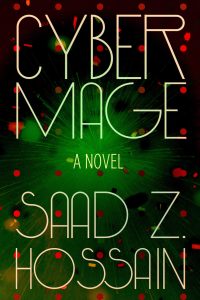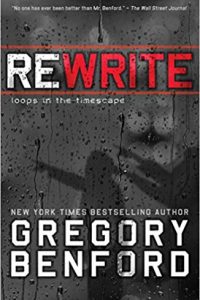Tim Pratt Reviews Wanderers by Chuck Wendig
 Wanderers, Chuck Wendig (Del Rey 978-0399182105, $28.99, 800pp, hc) July 2019.
Wanderers, Chuck Wendig (Del Rey 978-0399182105, $28.99, 800pp, hc) July 2019.
My prior knowledge of Chuck Wendig came mostly from his blog and his amusingly profane social media presence – Wanderers is the first novel of his I’ve read. It won’t be the last.
The premise is pure narrative candy: people in rural Pennsylvania begin to sleepwalk, heading west. At first there’s just one walker, but she’s soon joined by a second, and a third, and more drift out to walk alongside them as the flock proceeds. No stimulus can wake them. Though some of them walk barefoot, their feet aren’t cut by rocks or glass, and hypodermic needles break against their strangely hardened skin. They don’t eat or rest (or eliminate waste), but never tire or flag. The walkers go around or climb over obstacles, deviating as little as possible from their mysteriously ordained path. If a walker is forcibly stopped, their blood pressure builds up, and they literally explode in a rain of blood and bone fragments – so people soon give up on trying to stop them.
The first sleepwalker is a teenage girl named Nessie, and she is followed by her desperate and worried wide-awake sister Shana, a take-no-shit, loyal-to-a-fault character who serves as one of the book’s most engaging protagonists. Shana doesn’t walk alone. As new walkers join the flock, their loved ones and friends come along too, keeping pace as best they can – the walkers are relentless, but slow, so their people (who come to be known as shepherds) can sleep and eat occasionally and still catch up.
Other characters illuminate different parts of the world, most gradually crossing paths in satisfying ways. Benji Ray is a former CDC scientist, disgraced and fired when he falsified data in order to stop what he viewed as an inevitable epidemic… but now he’s been hired to investigate the walkers alongside his former colleagues (some of whom welcome him, and some of whom don’t). The company that hired him controls an enigmatic artificial intelligence named Black Swan, a system tasked with predicting disasters and plagues – and Black Swan both foresaw the coming of the walkers and requested Benji investigate.
On the other side from science, Matthew Bird is a well-meaning if weak-willed small-town minister, but when he gives an apocalyptic sermon and speculates that the sleepwalkers are a sign of the End Times, he becomes a darling of right-wing religious fanatics and white supremacists who think his message could be used to galvanize their people and draw new members to their cause. Dizzied by the new attention and fame, and urged to denounce the walkers as terrorist weapons and agents of the Devil, Matthew doesn’t realize the true goals of his new friends until it’s way past too late.
Other characters of note include an aging rock star with secrets who becomes a shepherd as a way of running from his own problems, only to find himself genuinely caring (though he remains something of an asshole); an ex-cop named Marcy who was horribly injured in an attack, but finds her pain mysteriously soothed in the company of the flock, which she views as angels; and Sadie Emeka, Benji’s sort-of boss and his liaison to the deeply creepy and enigmatic Black Swan.
The bizarre phenomenon of the walkers stirs up the hatred of fanatics and militias in an America that’s already on the edge of civil war, and that tension accounts for much of the violence in the early parts of the book… but there are bigger, fabric-of-society-destroying problems growing in the background that eventually come to the fore. Maybe the walkers aren’t exactly a sign of the end times, but they are connected to an apocalyptic situation in surprising and clever ways. There are a couple of big reveals that made me say “Damn, Chuck” and admire his authorial audacity.
I’ve always liked big long books about the apocalypse. I read Stephen King’s The Stand as a teenager, and loved it, as millions of other readers did; it’s still the gold standard of the form, and Chuck Wendig name-checks King’s classic here. Like The Stand, and McCammon’s Swan Song, and Cronin’s The Passage, and Niven & Pournelle’s Lucifer’s Hammer (which is also obliquely referenced, I suspect, as Wanderers has a portentous comet in its opening pages), this isn’t just a post-apocalyptic story: it’s a pre-, peri-, and post-apocalyptic novel, viewed through the eyes of multiple viewpoint characters who have lots of room to strive and suffer across a generous and sprawling page count. The Wanderers holds up just fine in their company.
In addition to being a senior editor and occasional book reviewer at Locus, Tim Pratt is the author of over 20 novels, most recently space opera The Wrong Stars, first in the Axiom series. His short stories have appeared in The Best American Short Stories, The Year’s Best Fantasy, The Mammoth Book of Best New Horror, and other nice places. He’s a Hugo Award winner for short fiction, and has been a finalist for World Fantasy, Sturgeon, Stoker, Mythopoeic, and Nebula Awards, among others. He lives in Berkeley CA with his family. Every month he writes a new story for his Patreon supporters at www.patreon.com/timpratt
This review and more like it in the September 2019 issue of Locus.
 While you are here, please take a moment to support Locus with a one-time or recurring donation. We rely on reader donations to keep the magazine and site going, and would like to keep the site paywall free, but WE NEED YOUR FINANCIAL SUPPORT to continue quality coverage of the science fiction and fantasy field.
While you are here, please take a moment to support Locus with a one-time or recurring donation. We rely on reader donations to keep the magazine and site going, and would like to keep the site paywall free, but WE NEED YOUR FINANCIAL SUPPORT to continue quality coverage of the science fiction and fantasy field.






